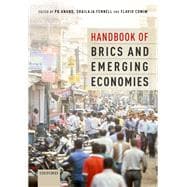Ever since Jim O'Neill at Goldman Sachs coined the term BRICS in 2001 there have been many different assessments of these major emerging economies, with some even proclaiming that the promise of the BRICS (comprising Brazil, Russia, India, China, and South Africa) is over. However, the so called 'arranged marriage' still seems to be working well, with the club having become a formal international forum, with summit declarations, ministerial meetings, and numerous BRICS-wide fora. Is this euphoria misplaced? Is there a BRICS model of economic and human development? Are inequalities increasing and is this the denouncement of the economic successes?
The Handbook of BRICS and Emerging Economies presents a comprehensive and multi-faceted analysis of the BRICS countries and other emerging economies, exploring their economic, social, environmental, and governance dimensions and other challenges. It brings together multi-disciplinary perspectives from more than fifty authors to examine how education contributed to the emergence of BRICS, how BRICS are impacting African economies, and how other emerging economies (including Chile, Mexico, Turkey, and others in Africa and Central Asia) compare. It observes the impact of governance challenges both within individual countries and in the forum for co-operation amongst them, what issues related to gender and identity based violence are prevalent, and what the security implications are and the role of BRICS is in contributing to peace keeping operations.








